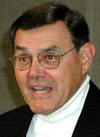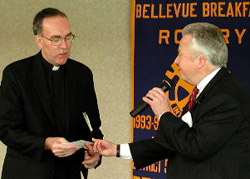|
Father Sundborg Calls for Moral Leadership
Father Stephen Sundborg is into his sixth year as President of Seattle University, where he has tried to continue to enhance the academic challenge to students to emphasize the school’s commitment to values, and keep the school connected to the community. Father Sundborg is no stranger to the BBRC. He delivered a program five years ago, which many still remember, on the remarkable changes in the nature of college student bodies.
|

Chuck Barnes introduces Father Sundborg.
|
This visit, Father Sundborg explored the notion of “moral leadership,” pointing out that one can be moral and one can be a leader, but the idea of a moral leader requires something additional. He pointed out that in our present reality, which he describes as a prolonged startled response as a nation since September 11 and since the failures in the American business system, more than ever, we need moral leaders.
A moral leader, according to Father Sundborg, is someone in a position of influence, who can lead from his or her own human qualities. In other words, it is the quality of our own humanity which comes through in these persons. He suggested that one attribute of such moral leaders is a long period of oppression, or fallowness, or suffering. Examples, in his opinion, of moral leaders are John Paul II, Martin Luther King, Elie Wiezel, Corazon Aquino, Colin Powell, Nelson Mandela, John McCain, Jimmy Carter, Ronald Reagan, the Dali Lama, and Mother Teresa. Father Sundborg wonders if any of our present leaders have gone through the tempering fires needed to allow them to speak as moral leaders.
Father Sundborg pointed out what he perceives to be qualities of a moral leader:
- A deep religious faith, appreciating the sacredness of human endeavor.
- The ability to surprise by pointing to the right thing to do and not taking an ideological approach. This allows one the freedom to move in the right direction.
- Never losing touch with themselves.
- The notion that it is never about them. They understand that the fault line of good and evil runs through everyone’s heart. This humility pervades a moral leader’s every action.
In our region, Father Sundborg points to Governor Dan Evans and Archbishop Raymond Hunthausen as moral meaders who lead from a position of moral strength and require people to look at issues morally. Some examples of persons from the Seattle area who Father Sundborg also suggested are moral leaders are Samuel Stroum, Dale Turner, Jim Ellis, Reverend Samuel McKinney, Farrell Lee Hartwell, Hubert Locke, Bill Gates, Sr., Jim McDermott, and Norm Rice. Father Sundborg was dismayed by the fact that he could not see new moral leaders on the horizon. He believes that many are too locked into ideological positions to have the freedom to apply their moral compass, and he laments the arising of strident and uncivil behavior in the public discourse.
|

Father Sundborg receives a certificate from Acting President Dick Brown for 240 doses of Polio vaccine contributed in his name.
|
Father Sundborg pointed out that a moral leader must have courage. He described a recent convocation of 25 Seattle students who were perceived as most likely to be future leaders. These students were quite willing to be leaders with a small “l” – ready to try to influence their smaller circle of contacts, but not wanting to take on the responsibility of a leader with a capital “L.” This was perceived simply to be too dangerous.
Father Sundborg posed the following fundamental criteria that he attributes to a moral leader:
- How much of what we do is motivated by a loving “why”?
- Who do we listen to? Who counts in our lives?
- It means putting yourself on the line; having the courage to take positions that will be perceived as politically or socially incorrect.
- How do we nourish our moral leadership? By faith, prayer, meditation, artistic endeavors, anything that is the act of the imagination.
- Willingness to identify new leaders from new generations. Who do you know that you would encourage to take the path of a moral leader?
As many remember Father Sundborg’s last visit to BBRC, we will surely remember this visit as well.
|